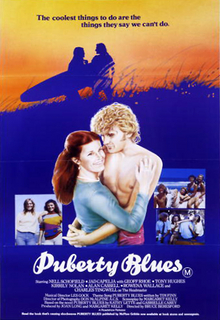Puberty Blues
| Puberty Blues | |
|---|---|

DVD cover
|
|
| Directed by | Bruce Beresford |
| Produced by |
Joan Long Margaret Kelly |
| Written by | Margaret Kelly |
| Based on | Puberty Blues by Gabrielle Carey and Kathy Lette |
| Starring |
|
| Music by | Les Gock |
| Edited by | William M. Anderson |
| Distributed by | Roadshow (Australia) Universal (US) 20th Century Fox (US) |
|
Release date
|
1981 |
|
Running time
|
87 minutes |
| Country | Australia |
| Language | English |
| Budget | AU $800,000 |
| Box office | AU$3,918,000 (Australia) |
Puberty Blues is a 1981 Australian coming of age film directed by Bruce Beresford. The film is based on the 1979 novel Puberty Blues, by Gabrielle Carey and Kathy Lette, which is a protofeminist teen novel about two 13-year-old girls from the lower middle class Sutherland Shire in Sydney. The girls attempt to create a popular social status by ingratiating themselves with the "Greenhill gang" of surfers, who have an unrestrained attitude toward casual sex, drugs and alcohol over the course of one Sydney summer.
For censorship reasons, in the film their age was increased to 16. Much of the content of the novel appears in the film, with several passages of text recounted by the film's protagonist Debbie (Nell Schofield) in a voice-over narration. The film closely follows the story and character trajectory of the novel. Some of the novel's characters are composites in the film. The tone of the novel is generally darker than that of the film, and in the novel Debbie and her best friend Sue, who join the surfer gang, are shown to be much more willing participants in activities than they are in the film. Some of the darker moments of the book have been removed or softened for the film. The film adds a comedy beach brawl between the surfers and the lifeguards not present in the novel.
Lette complained that "the film sanitised the plot by omitting central references to miscarriage and abortion. The movie depicts a culture in which gang rape is incidental, mindless violence is amusing and hard drug use is fatal, but it was unable to address the consequences of the brutal sexual economy in which the girls must exist."
Much of the obscure surfer slang of the novel was omitted from the film. The novel features some discussion about television series Number 96. One passage of the novel that mentions the title is recounted by the film's protagonist in a voice-over narration, but because the series had ended by the time of the 1981 film the series title is replaced by the generic term "television".
...
Wikipedia
